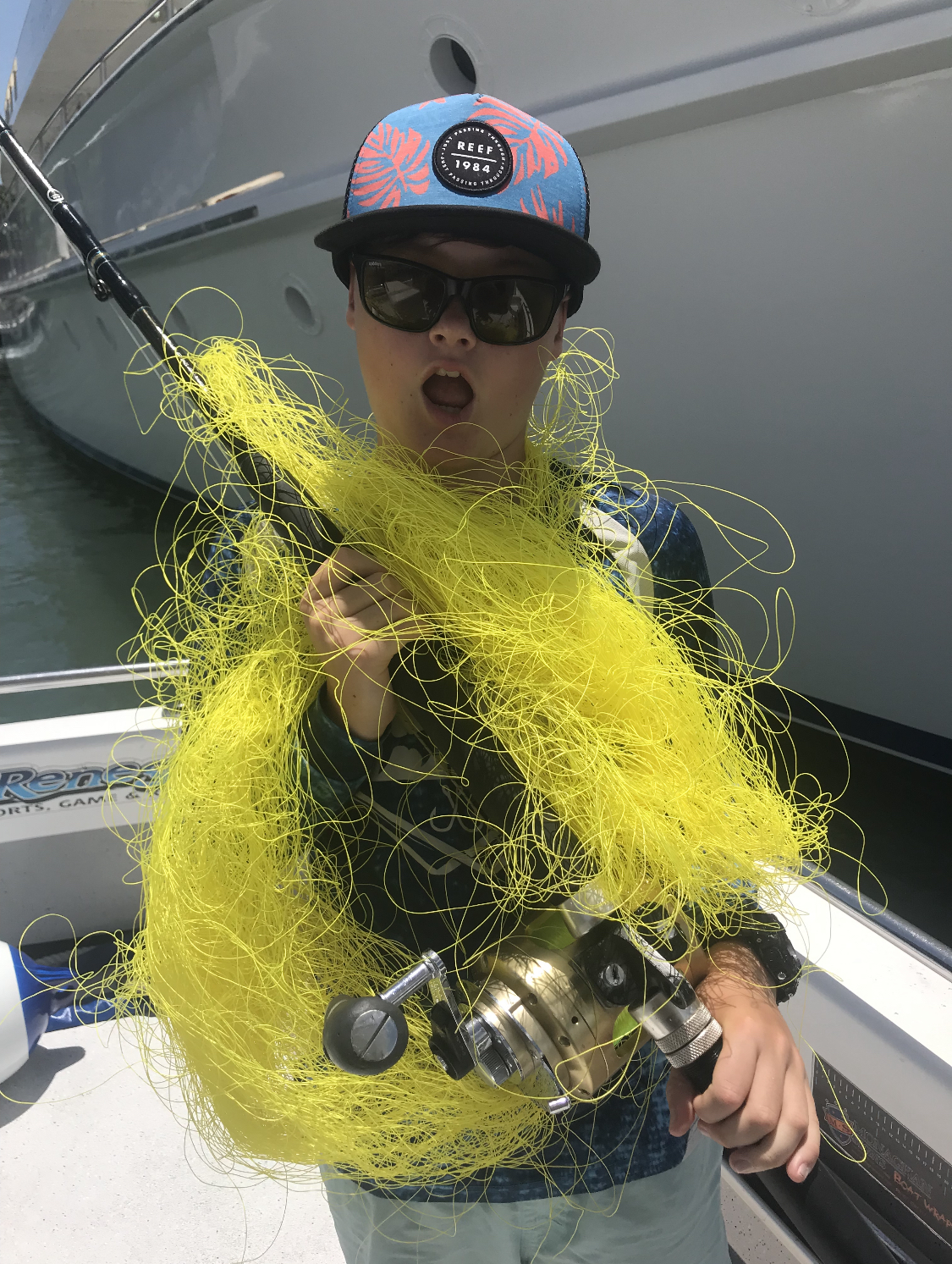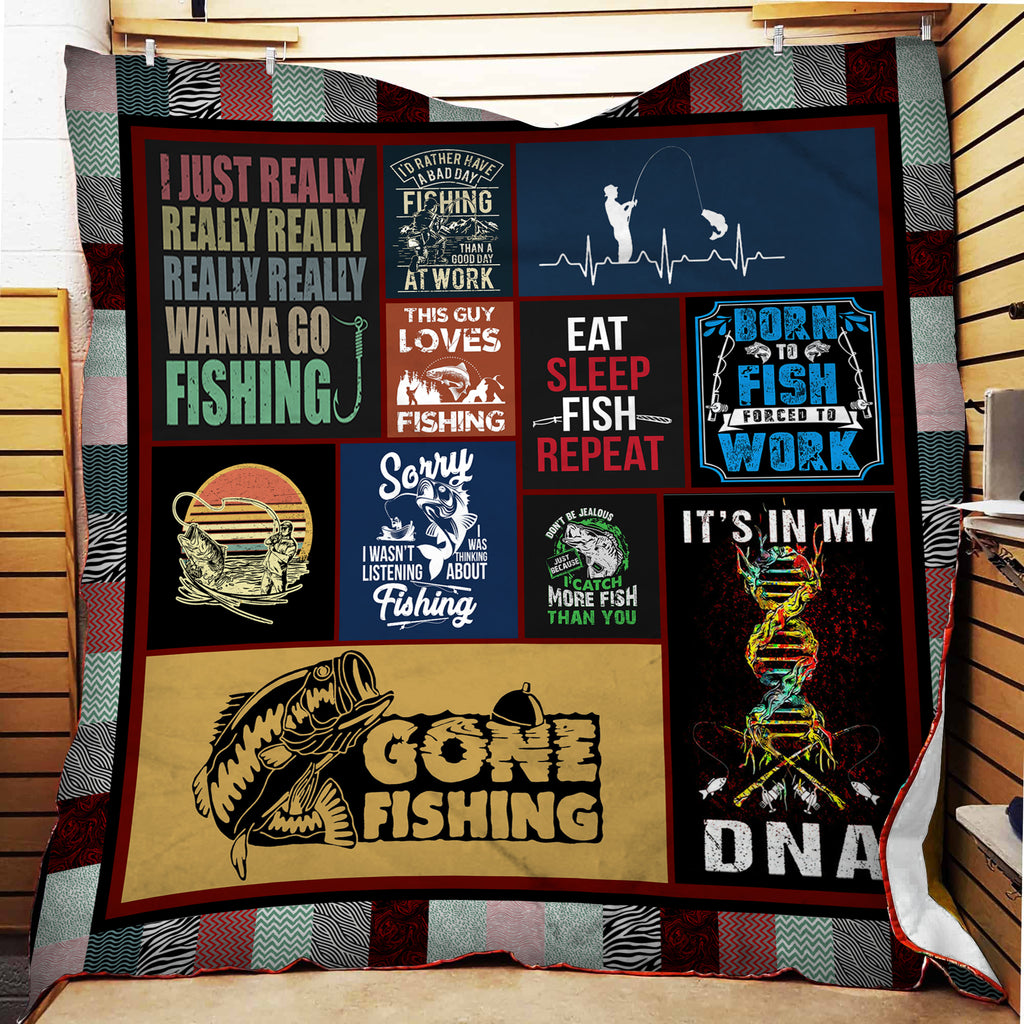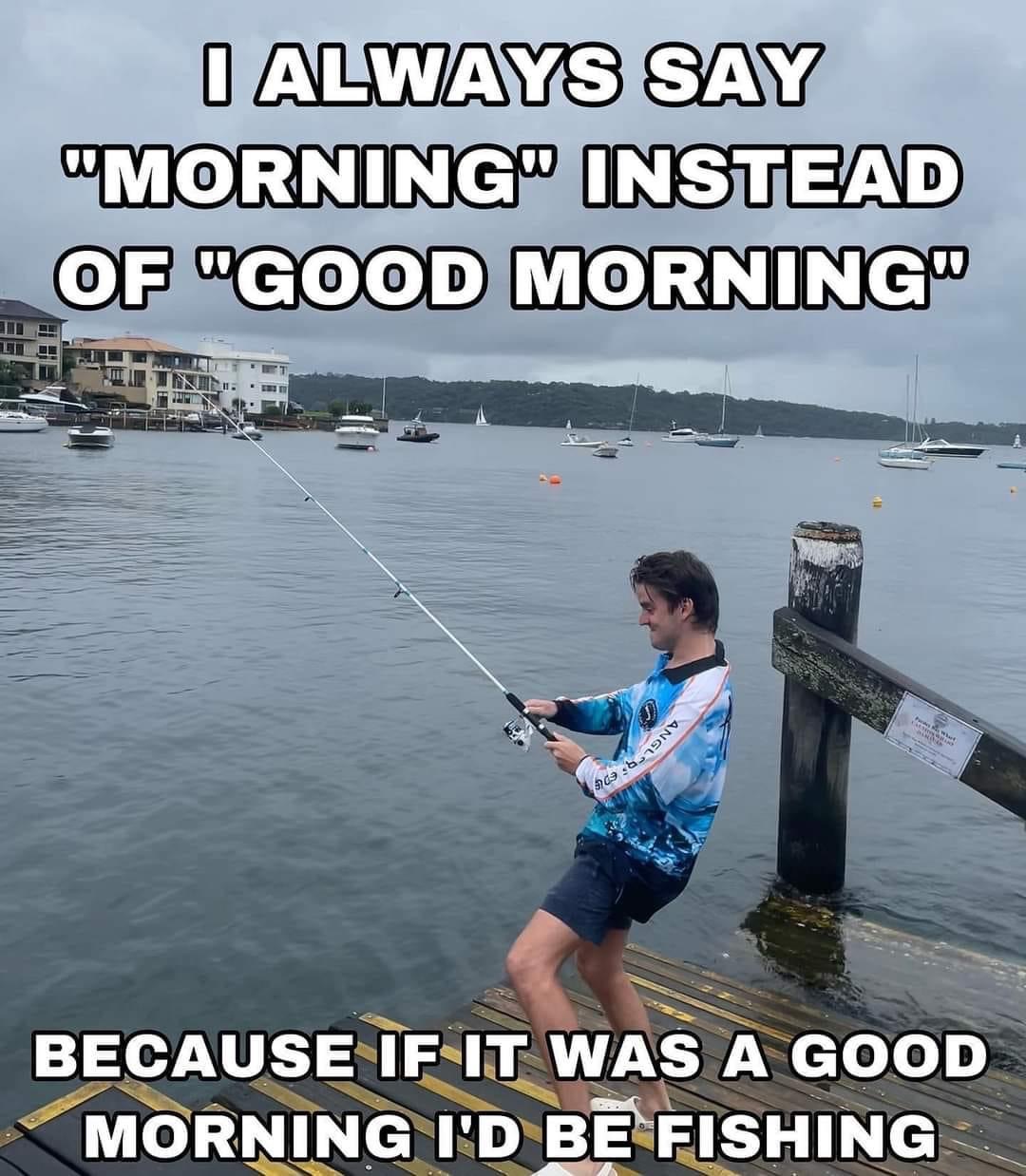The "wanna go fishing meme" has, in a way, become a rather familiar sight across the internet, popping up in chats and on social media feeds. This simple phrase, often paired with an image that makes you chuckle, captures a feeling many of us know well: the sudden urge to step away from the daily grind and just, well, go fishing. It is that kind of casual invitation, a relaxed way of asking someone to join in on a pleasant activity, which makes it resonate with so many people looking for a bit of calm or a friendly connection in their busy days.
You see, the charm of this particular meme, and others like it, often comes from its very informal language. The word "wanna," for instance, is a contraction, a shortened way of saying "want to." This kind of speech is, as a matter of fact, very common in our everyday conversations, whether we are speaking out loud or typing quick messages to friends. It is this relaxed style that helps these memes spread so easily, making them feel like a genuine, spontaneous thought from one person to another, almost like a quick whisper between pals.
This casual approach to language, which is really at the heart of the "wanna go fishing meme," shows us a lot about how we communicate in the modern world. We often choose words that are easy to say and easy to type, favoring speed and a friendly tone over strict grammatical rules. This preference for informal expressions helps build a sense of closeness, making online interactions feel a bit more like real-life chats, even when we are miles apart, you know.
Table of Contents
- What Makes the "Wanna Go Fishing Meme" So Popular?
- How Does "Wanna" Fit into the "Wanna Go Fishing Meme"?
- When Should We Use "Wanna" in Our Daily Chats?
- The Roots of Informal Language - Why Do We Say "Wanna" and "Gonna"?
- The Gaming World and the "Wanna Go Fishing Meme" Spirit
- Beyond Fishing - What Else Do People "Wanna" Do?
- How Everyday Expressions Shape Our Digital Lives, and the "Wanna Go Fishing Meme"
- The Art of Simple Communication in the Age of the "Wanna Go Fishing Meme"
What Makes the "Wanna Go Fishing Meme" So Popular?
The enduring appeal of the "wanna go fishing meme" comes from its straightforwardness and its connection to a universal desire for peace or a break. It is, you know, a simple expression of a wish to escape the usual routine, to find a quiet moment by the water. This meme often strikes a chord because many people, perhaps feeling the weight of their responsibilities, often dream of such a simple outing. The image usually shows a calm scene, maybe a serene lake or a peaceful river, which just adds to the feeling of wanting to get away from everything that is loud or stressful. It is a visual representation of a shared yearning, a collective sigh for some tranquility, so it resonates widely.
Furthermore, the "wanna go fishing meme" often carries a lighthearted humor. It is not a demand, but more of a gentle suggestion, a playful nudge. This humorous quality makes it easy to share with friends, almost like an inside joke among people who understand the feeling. The casual phrasing, using "wanna," makes it feel less like a formal invitation and more like a spontaneous thought that just popped into someone's head. This informal tone, which we see in many popular online expressions, helps to build a sense of community, allowing people to connect over a shared laugh or a common aspiration, in a way that feels very natural.
The meme's popularity also stems from its adaptability. While the core message is about fishing, the feeling it conveys can apply to many other situations where someone just wants to relax or do something enjoyable. It is, basically, a stand-in for any simple pleasure that offers a break from the ordinary. This flexibility means that people can use the "wanna go fishing meme" in various contexts, from suggesting a real-life fishing trip to simply expressing a wish for a moment of peace during a hectic day. It is a simple tool for conveying a complex feeling, a desire for something different, which is quite clever.
- Minitinah Before Surgery
- Billie Eilish Bikini Video
- Does Kai Cenat Have Adhd
- Donovan Mitchell Gay
- Gourmia Air Fryer Recalls
How Does "Wanna" Fit into the "Wanna Go Fishing Meme"?
The word "wanna" is, quite honestly, the very heart of the "wanna go fishing meme." It is the key ingredient that gives the meme its distinct flavor of informality and approachability. "Wanna" is a common spoken contraction for "want to," and its use immediately signals a relaxed, casual tone. When you see "wanna" in a message, you typically understand that the sender is not being formal or overly serious. This makes the invitation to go fishing feel light and easygoing, rather than a heavy commitment, which is a good thing.
This choice of "wanna" over "want to" is, in some respects, a deliberate one in meme culture. Memes thrive on quick, digestible content, and contractions help achieve this. They make the text shorter, easier to read at a glance, and quicker to type. So, when someone shares the "wanna go fishing meme," they are not just sharing an image; they are also sharing a linguistic shortcut that is widely recognized and understood in casual digital communication. It is a sign that the message is meant to be friendly and not at all formal, which is pretty important.
The use of "wanna" also reflects how language evolves in spoken form. As we learn from various sources, words like "wanna" and "gonna" (for "going to") are used very frequently in everyday conversations. They just roll off the tongue more easily. This natural flow of spoken language often finds its way into written communication, especially in informal settings like social media or text messages. The "wanna go fishing meme" just perfectly captures this linguistic habit, making it feel very authentic to how people actually talk and type to one another, you know.
When Should We Use "Wanna" in Our Daily Chats?
Knowing when to use "wanna" in your daily chats is, basically, about understanding the situation and the people you are talking with. It is perfectly fine, and often preferred, when you are speaking or writing to friends, family, or anyone in a very relaxed setting. For example, if you are texting a friend about plans, saying "wanna grab coffee?" feels much more natural and friendly than "do you want to grab coffee?" It is a simple way to keep the conversation flowing smoothly and casually, so it is quite useful.
However, it is generally a good idea to avoid "wanna" in more formal situations. This means not using it in important emails, official reports, academic papers, or during job interviews. In these settings, using the full "want to" shows respect for the formality of the situation and helps maintain a professional tone. It is, in a way, about choosing the right clothes for the right event; you would not wear a swimsuit to a business meeting, and you would not typically use "wanna" in a formal letter, for instance.
Think of it this way: "wanna" is for when you are being yourself, just chatting away. It is for those moments when you are sharing a quick thought, like when someone might say "hey wanna play/team up" in a gaming context, or when they are quickly letting you know they are getting "food, brb." These are all moments of spontaneous, easy communication. The key is that "wanna" helps you sound approachable and genuine, which is very important for building rapport in informal exchanges, and that is a good thing.
The Roots of Informal Language - Why Do We Say "Wanna" and "Gonna"?
The use of words like "wanna" and "gonna" has, in fact, deep roots in the way people naturally speak. These are not new inventions; they have been around for a long time in spoken English. They come about because, when we talk quickly and casually, our mouths and tongues tend to take shortcuts. It is simply easier to say "wanna" than "want to" when you are speaking at a normal pace. This natural tendency to simplify sounds is a common feature of all spoken languages, which is quite interesting.
These contractions are, basically, examples of what linguists call "reductions" or "elisions." Sounds get dropped or blended together to make speech more efficient. For instance, "going to" often becomes "gonna," and "got to" can turn into "gotta." This process is not a sign of lazy speech; rather, it is a sign of how language adapts to the needs of everyday communication. It shows how people prioritize speed and fluidity when they are having a conversation, which is very practical.
It is also worth noting that these informal versions often do not have a direct written equivalent that became standard. For example, while "wanna" and "gonna" are widely used, a word like "wenna" (for "went to") did not catch on in the same way, as history shows. This is because language change is not always perfectly logical; it is more about habits that form over time within a community of speakers. So, some contractions become popular and widely accepted in speech, while others do not, which is just how it is.
The Gaming World and the "Wanna Go Fishing Meme" Spirit
The gaming world, in some respects, is a prime example of where informal language, much like that in the "wanna go fishing meme," really thrives. Gamers often communicate in quick, abbreviated phrases to keep up with the fast pace of online play. You will frequently hear things like "ggs, gotta go, see ya next time" or "brb" (be right back). These expressions are all about efficiency and maintaining a friendly, casual atmosphere, which is very much in line with the spirit of the fishing meme.
Consider the phrase "I Wanna you get through this game." This shows how "wanna" is used to express a desire or an intention within a gaming context. It is about wanting to achieve something, or wanting someone else to succeed, often in games that are known for being quite difficult. This idea of a shared goal or a simple wish, expressed informally, connects directly to the "wanna go fishing meme," where the wish is for a relaxing activity. It is all about a straightforward expression of a personal desire, you know.
Even when a game presents a tough challenge, like those "I Wanna" games where you might "die 600 times," the desire to keep going, the "wanna" to finish, remains strong. This persistence, combined with the casual communication style, shows how informal language supports a community's shared experiences, whether it is about overcoming a difficult game level or simply wanting to relax by a virtual or real fishing spot. It is a very direct way to convey intent, which is quite useful.
Beyond Fishing - What Else Do People "Wanna" Do?
The "wanna go fishing meme" is just one example of how "wanna" expresses a desire, but people "wanna" do a lot of other things too. This simple word can convey a wide range of intentions, from the very mundane to the deeply personal. For instance, someone might say "I just wanna a reply" when they are waiting for an answer to an important question, showing a clear and immediate need. This illustrates how "wanna" cuts straight to the point, expressing a core desire without any extra fuss, which is quite direct.
In a more playful or even sarcastic context, "wanna" can be used for humorous effect. Think of a phrase like "I'd slap you but I don't wanna make your face look any better." Here, "wanna" is used to express a desire that is then deliberately suppressed for a comedic punchline. This shows the versatility of the word in informal settings, allowing for a range of tones from genuine desire to witty banter. It is, basically, a very flexible tool in casual speech, which is pretty neat.
Even in situations where people are exploring new interests, the underlying "wanna" is present. Someone might "wanna" learn about a new brand, or understand a complex topic, or get better at a game with peculiar controls, like one with a strange double jump. This inherent desire to explore and understand is often expressed in simple, direct terms. The "wanna" reflects a basic human curiosity or aspiration, making it a powerful little word that gets right to the heart of what someone intends to do, or wishes for, so it is quite telling.
How Everyday Expressions Shape Our Digital Lives, and the "Wanna Go Fishing Meme"
Everyday expressions, including those like "wanna," play a rather significant role in shaping how we interact in our digital spaces. They make online communication feel more human and less like formal writing. When you see a "wanna go fishing meme," it feels like a casual chat with a friend, not a carefully crafted message. This informality helps to bridge the gap between face-to-face conversations and typed messages, creating a more relaxed and approachable online environment, which is quite helpful.
These common phrases, often contractions or slang, are like shorthand for shared experiences and feelings. They create a sense of belonging among those who understand them. Just as knowing the nuances of a word like "literally" can make you feel part of an in-group, using or understanding "wanna" in the context of a meme connects you to a wider online community. It is a subtle way of signaling that you are part of the casual, fast-paced world of internet culture, which is very much a thing.
The widespread use of such expressions also shows how quickly language can evolve, especially with the influence of the internet. New memes and phrases pop up all the time, and they spread rapidly because they tap into common human experiences or desires. The "wanna go fishing meme" is a perfect example of this, as it captures a simple, relatable desire using language that feels natural and familiar to a broad audience. It is a testament to the power of simple words to convey complex feelings, in a way that is quite effective.
The Art of Simple Communication in the Age of the "Wanna Go Fishing Meme"
The "wanna go fishing meme" highlights, quite clearly, the art of simple communication in our fast-paced world. It shows that you do not always need complex sentences or formal words to get your message across effectively. Sometimes, a short, direct phrase, combined with a relatable image, can convey a lot of meaning and emotion. This approach is very effective in online spaces where people often scroll quickly and have limited attention spans, so it is a good strategy.
This simplicity also encourages more people to participate in online conversations. When the language is easy to understand and use, it lowers the barrier to entry. Anyone can share a "wanna go fishing meme" or use "wanna" in their own messages, regardless of their formal writing skills. This inclusivity helps to build a more connected and vibrant online community, where more voices can be heard and more connections can be made, which is pretty cool.
Ultimately, the popularity of the "wanna go fishing meme" and similar informal expressions reminds us that communication is, at its core, about connecting with other people. Whether it is a desire for a peaceful activity, a quick question about a game, or a simple request for information, using language that feels natural and human helps to build genuine connections. It is a powerful reminder that sometimes, the simplest words are the most effective in reaching out and sharing a feeling, you know.



Detail Author:
- Name : Darien Pollich
- Username : ukshlerin
- Email : odell01@gmail.com
- Birthdate : 2002-12-09
- Address : 4563 Johnpaul Oval Suite 048 Shieldsfort, TN 77734-3391
- Phone : +1.820.712.7007
- Company : Cormier-Rolfson
- Job : Postal Service Clerk
- Bio : Sint error deserunt qui. Nam provident et deleniti perspiciatis officia hic. Quo ut mollitia est sunt. Voluptatem dicta nostrum enim vero in nulla.
Socials
twitter:
- url : https://twitter.com/jgerlach
- username : jgerlach
- bio : Voluptatem illo eum quas qui amet. Autem nihil eaque voluptatem quo quisquam. Sed optio harum suscipit nihil et.
- followers : 1624
- following : 1713
instagram:
- url : https://instagram.com/jessika9922
- username : jessika9922
- bio : Beatae blanditiis aut quo illum distinctio. Ipsa voluptates illum in delectus odit.
- followers : 4260
- following : 1823
tiktok:
- url : https://tiktok.com/@jessika_id
- username : jessika_id
- bio : Doloribus nihil dolorem corporis vel libero.
- followers : 4733
- following : 203